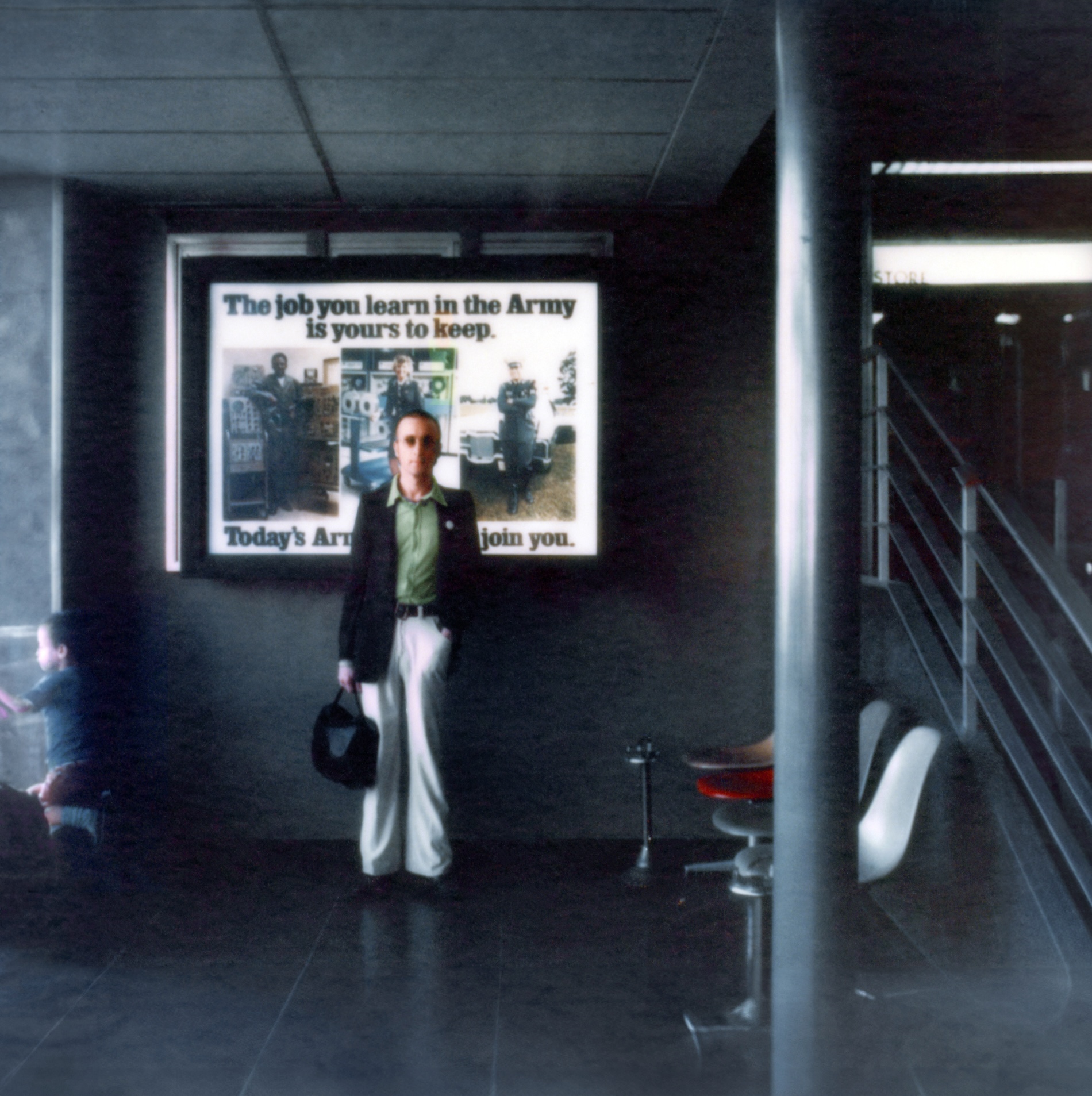
John Lennon at the airport, 1973 (Photo © Yoko Ono Lennon; used with permission)
The 50th anniversary edition of John Lennon’s 1973 solo album, Mind Games, has won the GRAMMY Award for Best Boxed or Special Limited Edition Package. The selection was among the categories announced prior to the primetime broadcast of the 67th Annual GRAMMY Awards on February 2, 2025. (The nominations were revealed on November 8, 2024.) Mind Games – The Ultimate Collection was produced and art directed by Sean Ono Lennon and Simon Hilton; they are the ones receiving the Grammy. In his remarks, Sean Ono Lennon noted what a privilege it is to work on his father’s projects.
The set was released on July 12 in several completely newly remixed and expanded Ultimate Collection editions offering “an immersive, deep listening experience and in-depth exploration of this classic, yet under-appreciated record.”
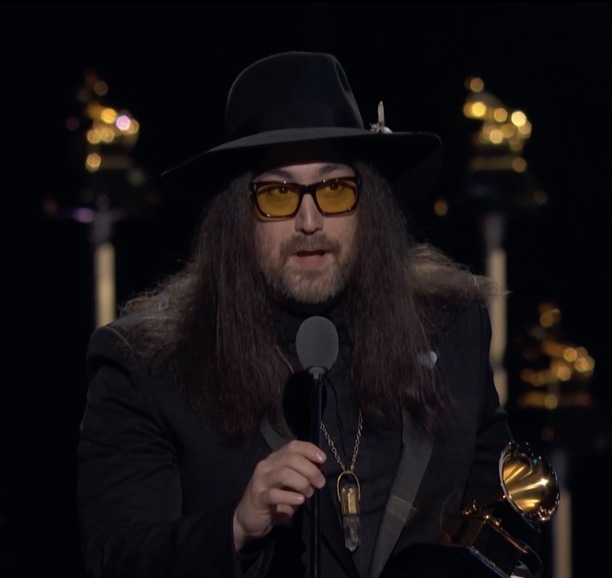
Sean Ono Lennon accepting the Grammy Award for Best Boxed Or Special Limited Edition Package for the 50th anniversary edition of John Lennon’s Mind Games album.
In a statement when the collection was released, Sean Lennon said, “I am absolutely thrilled that the… boxed set that we worked so hard on for several years has been nominated for a GRAMMY Award. It has been the honor of a lifetime for me to work on my father’s music and to be able to reintroduce it to the world. My mom and I are so appreciative of the recognition.”
On the night of the Grammy win on Feb. 2, Lennon said, “When Simon and I started, I actually didn’t realize but when Mind Games came out, it wasn’t really very well received by critics. Once I found that out, Simon and I had a mission to prove to the world that Mind Games was a masterpiece and we wanted people to give it a second chance.”
The Mind Games – The Ultimate Collection releases are from the John Lennon Estate and Capitol/UMe, in a variety or formats, ranging from digital and 2-CD (U.K. here) and 2-LP versions to a Deluxe box set featuring 6-CDs and 2 Blu-ray discs. The various editions are available in the U.S. here and in the U.K. here.
This marks Sean Ono Lennon’s first GRAMMY nomination and the 43rd nomination for the Lennon family, which includes one nomination for Julian Lennon, two wins and five nominations for Yoko Ono Lennon and seven GRAMMY Awards and 36 nominations for John Lennon – for both his solo work and work with The Beatles – who also received new nominations on Nov. 8 for Record Of The Year and Best Rock Performance for “Now And Then,” the last Beatles song.
we have 3 grammy nominees in this photo ♡ pic.twitter.com/dup3iaJ8q0
— ingryd ♡ ㅡ ((°⍸°))♟️ (@ceofjohnlennon) November 8, 2024
Several songs that were included as “hidden tracks” have been shared on streaming services. In 1973, Lennon, George Harrison and Ringo Starr reunited in the studio for the first time since the breakup of The Beatles in 1970 to record the song “I’m The Greatest” for Ringo’s eponymous solo album released that year.
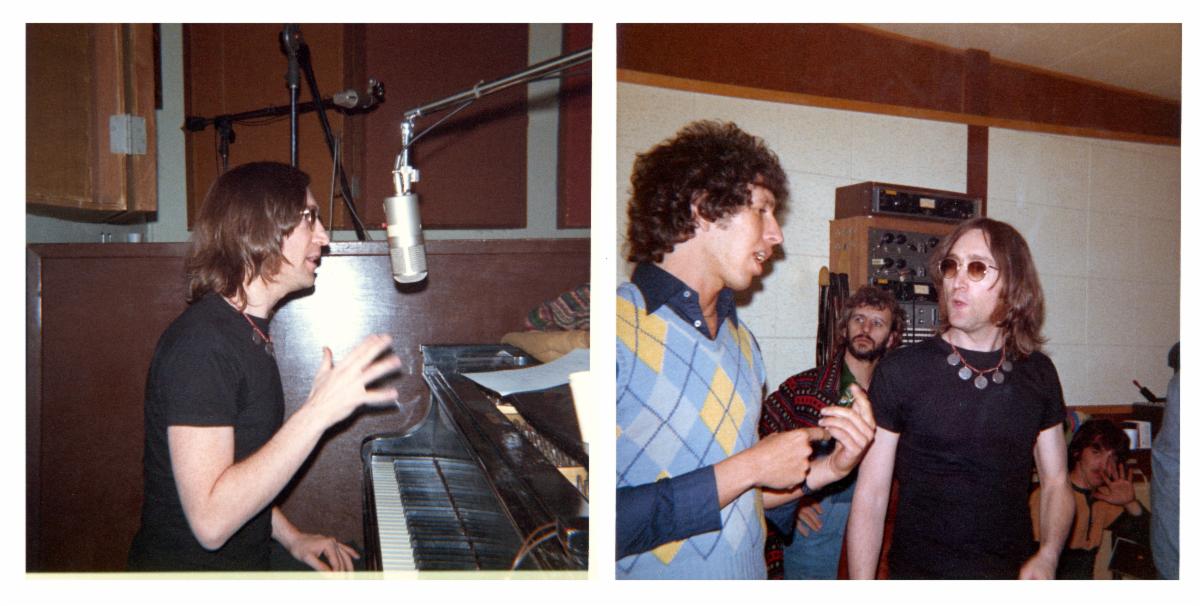
“I’m The Greatest” recording session, Sunset Sound in Los Angeles, March 1973. Left photo: John Lennon; Right photo: (L to R) Richard Perry, Ringo Starr, John Lennon, George Harrison © Capitol Records; used with permission
Recorded at Sunset Sound in Los Angeles in March 1973, John, George and Ringo were joined by long time Beatles’ associates Klaus Voormann on bass and Billy Preston on organ, with producer Richard Perry at the helm. This would be the only time the three former Beatles recorded together between the band’s breakup and John’s death in 1980. The song was inspired by Muhammed Ali’s famous catchphrase.
Watch an “Evolutionary Documentary” of the title track below along with never-before-seen footage of John and Yoko that’s featured in videos for several songs.
From our earlier coverage of the boxed set: The releases, announced on May 15 after a teaser campaign, were produced by Sean Ono Lennon, who oversaw the production and creative direction, and are from the same audio team that worked on the critically acclaimed Imagine and John Lennon/Plastic Ono Band Ultimate Collections, including triple GRAMMY®-Award winning engineer Paul Hicks, and mixers/engineers Sam Gannon and Rob Stevens. The new Ultimate Collection puts listeners in the center of the studio and explores the album’s 1973 recording sessions at the Record Plant in New York City, from inception to the final master, through scores of unreleased outtakes, unadulterated versions, instrumentals, stripped down mixes, studio chatter and more, revealing how these fan favorite songs evolved and came to life.
The original Mind Games album was recorded at the Record Plant in New York City with Lennon producing and released in October 1973 on Capitol Records. Humorously named the Plastic U.F.Ono Band, the performers were a who’s who of New York’s elite session musicians, including guitarist David Spinozza, bassist Gordon Edwards, drummers Jim Keltner and Rick Marotta, pianist Ken Ascher, pedal-steel player “Sneaky” Pete Kleinow, saxophonist Michael Brecker, with backing vocals by Something Different, featuring Angel Coakley, Christine Wiltshire, Jocelyn Brown, and Kathy Mull.
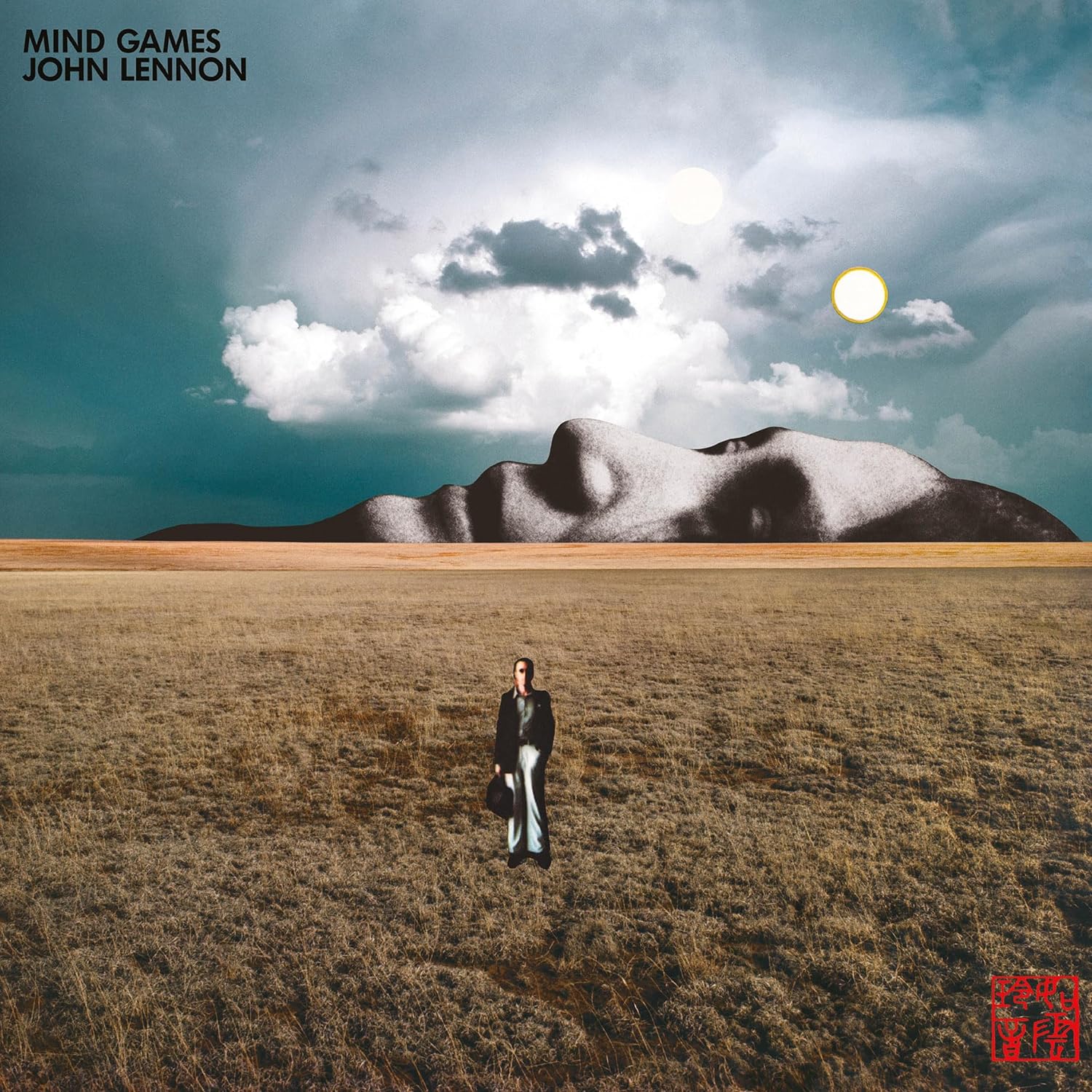
More from the May 15 audio announcement: Mind Games – The Ultimate Collection offers six different unique listening experiences that are at once immersive and intimate, ranging from the brand new Ultimate Mixes of the original album, which put Lennon’s vocals front and center and sonically upgrade the sound, to the Elements Mixes, which isolate and bring forth certain instruments from the multitrack recordings to highlight playing previously buried in the original mix, and the Raw Studio Mixes, which allows listeners to hear the recording that Lennon and The Plastic U.F.Ono Band laid to tape, mixed raw and live without vocals effects, tape delays or reverbs.
The Out-Takes allow listeners to hear compelling different takes of each song, while the Elemental Mixes, a new set created especially for this project, inhabit a world between the minimalism of the Elements Mixes and the Ultimate Mixes, stripping the songs back to simpler, lean-back arrangements with Lennon’s voice to the fore, and without drums.
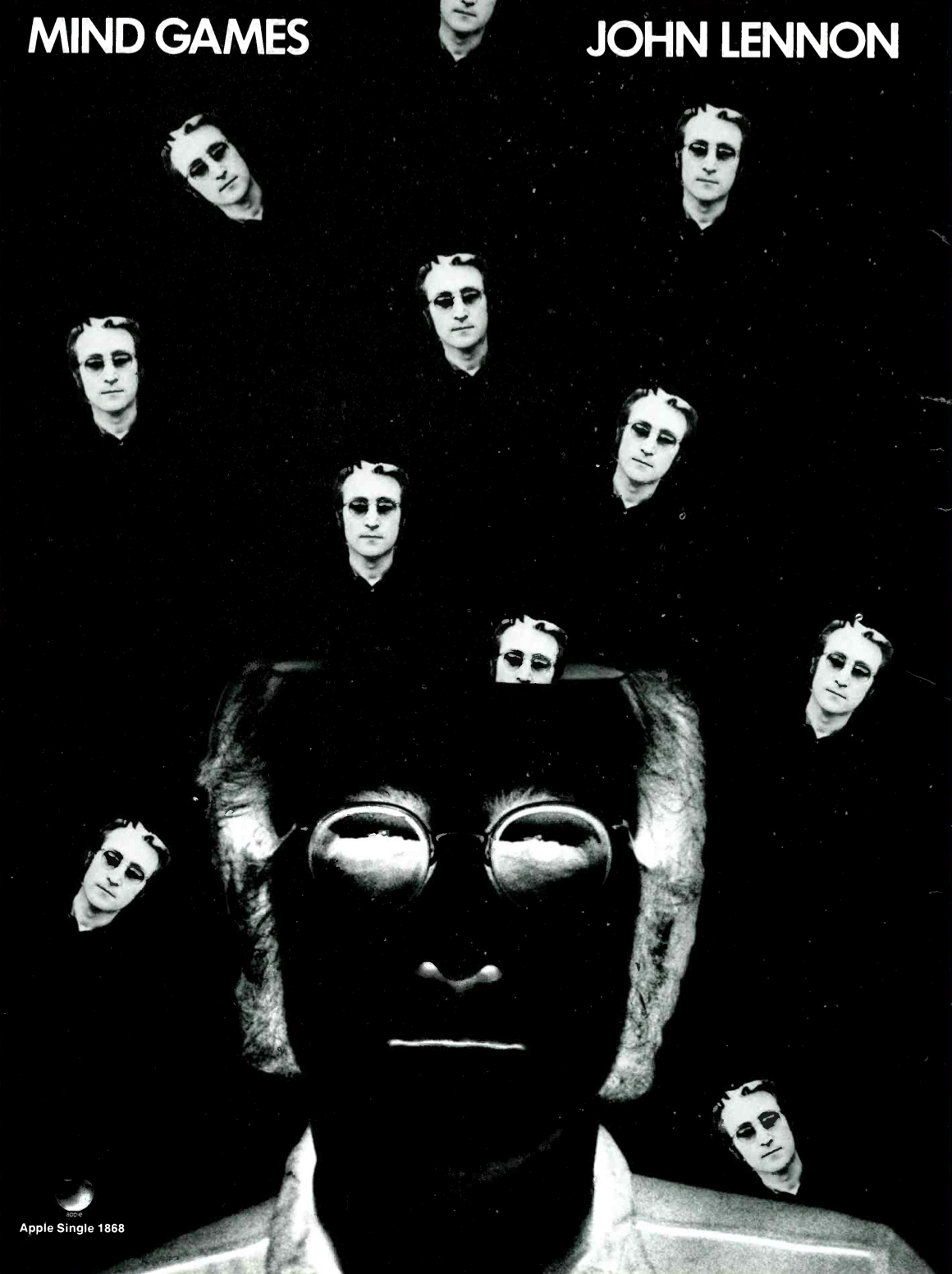
This ad for the “Mind Games” single appeared in the Oct. 27, 1973 issue of Record World
The Evolutionary Documentary is a unique track-by-track audio montage that details the evolution of each song from demo to master recording via demos, rehearsals, out-takes, multitrack exploration, and studio conversations.
In never-seen-before home video footage from February 1970, Lennon is seen and heard writing an early demo version of “Mind Games” – then called “Make Love Not War” – on his favorite composing piano in the upstairs bedroom at Tittenhurst Park, his home with Yoko Ono in Ascot. The song already contains the melody and chords, the “make love not war” refrain and the “love is the answer” chorus. The footage was found amongst other home video materials during a deep search in the archives for content for Mind Games – The Ultimate Collection, along with the original (also never-seen-before) lyrics for the song.
In Part Two of the clip, Lennon is at the Record Plant on August 4, 1973, with all the musicians, where he recorded seven takes of “Mind Games.” Included here are excerpts from Take 3 where Yoko is heard helping John out with production duties from the control room. The clip evolves with the start of the exploration of the Master multi-track (Take 2) with Lennon referencing his starting pitch on the piano over the solo slide guitar and Mellotron. Additional overdubs were added to the Master ready for the mix on August 23.
Watch the official lyric video for “Mind Games” (The Evolutionary Documentary)
An array of listening options, including High-Definition, studio quality 192kHz/24bit audio in stereo and enveloping 5.1 Surround and Dolby Atmos mixes, are available on Blu-ray. All of the tracks have been completely remixed from scratch from the 15 original two-inch multitrack session tapes using brand new 192-24 digital transfers.
Never-before-seen footage of John and Yoko, filmed in July 1968 at John’s first major art show, You Are Here (To Yoko From John Lennon, With Love) at London’s Robert Fraser Gallery, has been paired together with the brand new Ultimate Mix of “You Are Here.”
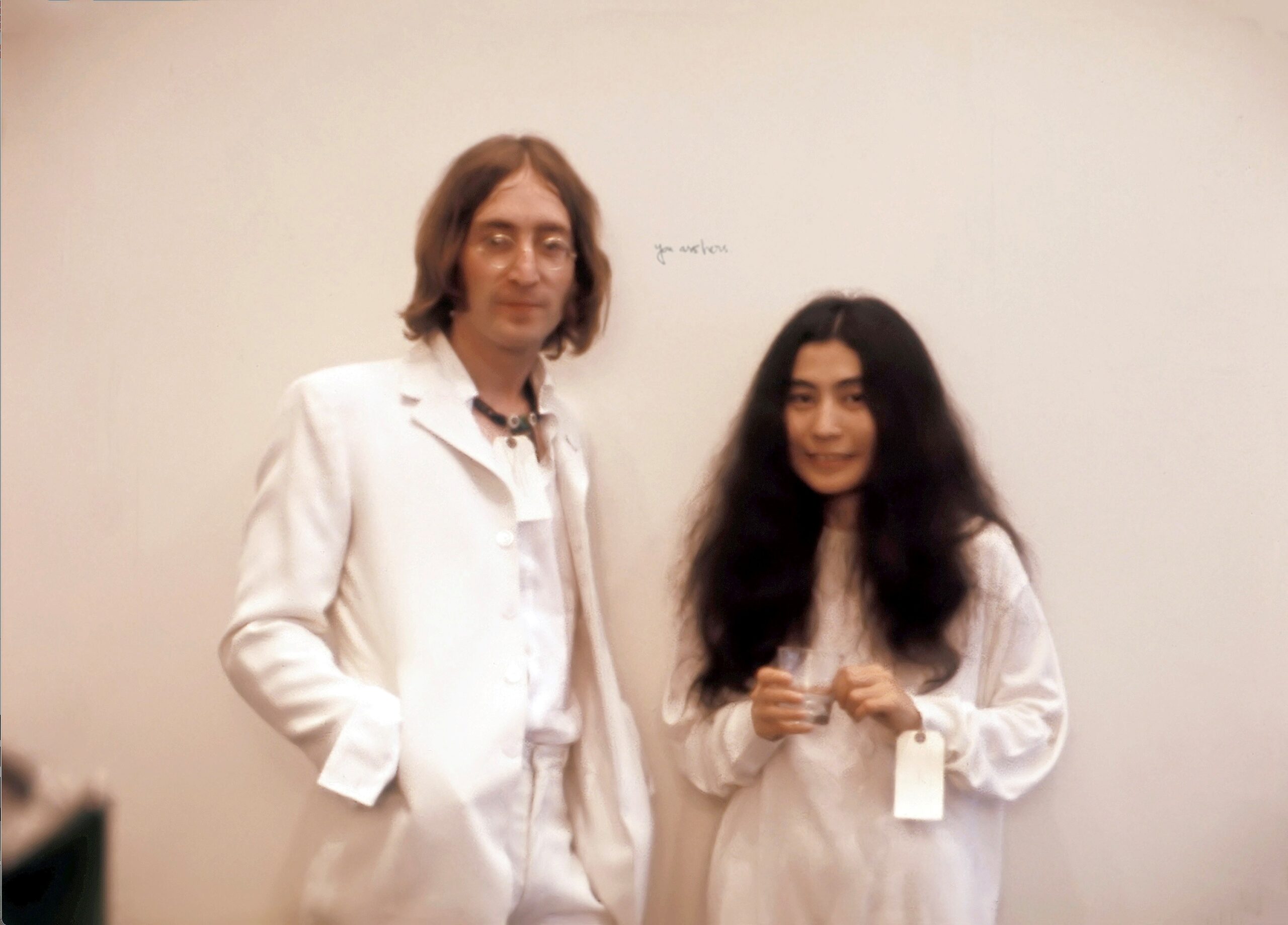
John Lennon and Yoko Ono at You Are Here Art Show Opening, July 1, 1968
The film crew, which was set up behind a dark window in the style of the hidden camera Candid Camera TV show, filmed people’s honest and at times humorous reactions as they walked through the gallery and encountered the various donation boxes which led up to the huge circular canvas with John’s handwritten message: “you are here.” Next to the minimalist artwork was a hat to put money in for “the artist.” The guests included various Beatles insiders.
Listen to the same song’s Elements Mix, featuring Sneaky Pete Kleinow on pedal steel guitar and Ken Ascher on organ
The Ultimate Collection includes previously unreleased out-takes and stems plus additional never-heard-before audio from archive ¼” reel-to-reels, cassettes and videotapes.
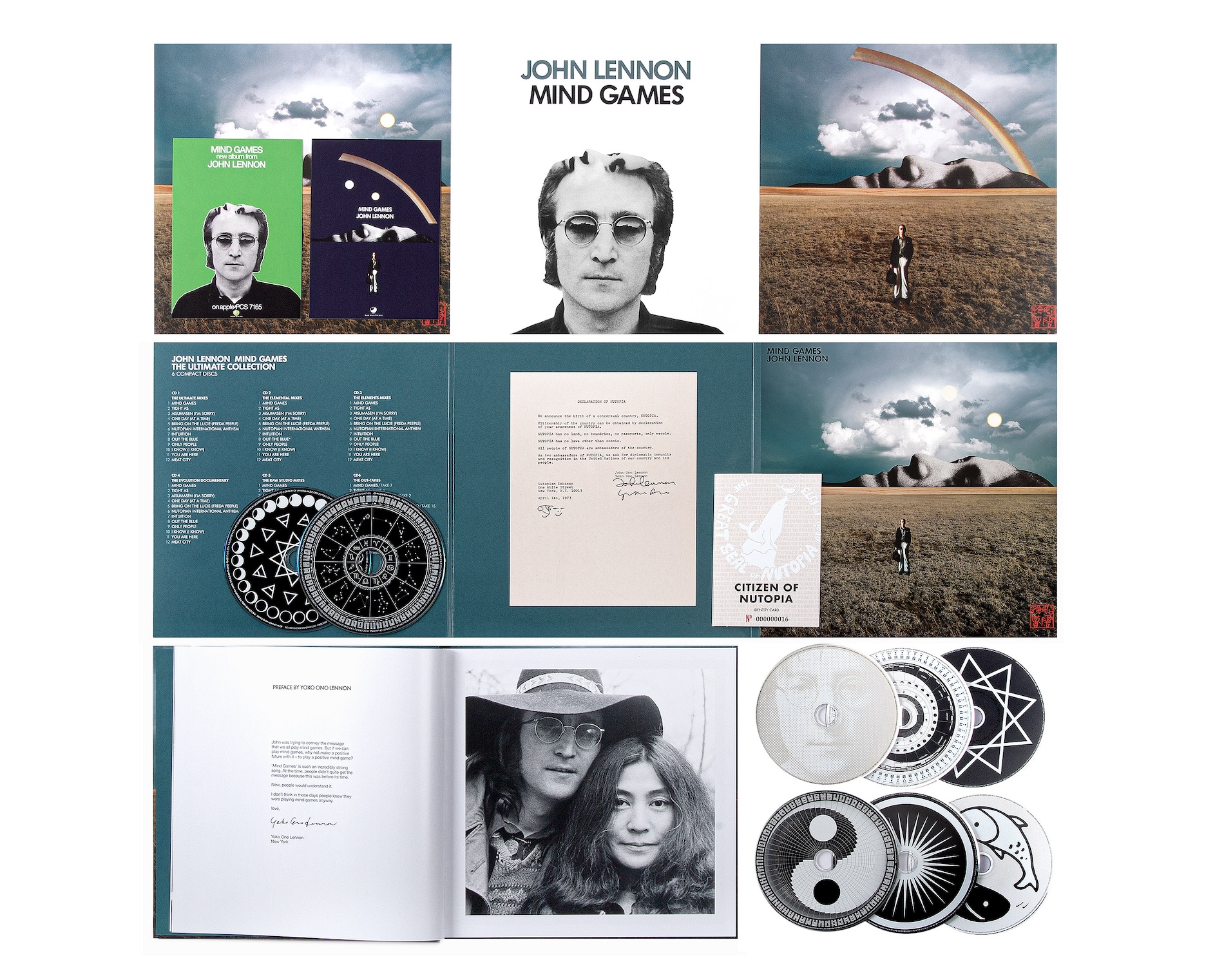
Mind Games Deluxe Edition box set
The Deluxe Edition presents Mind Games in a 10” x 10” box set, with 72 tracks across six CDs and two High-Definition Blu-ray Audio discs (with high resolution 24-96 stereo, 5.1 and Dolby Atmos versions) for more than seven hours of music. A number of hidden audio and video tracks, along with secret messages and other “Easter Eggs” are spread across the set.
Designed and edited by Simon Hilton, the Compilation Producer and ProductionManager of the Ultimate Collection series, a 128-page glossy hardback coffee table book tells the story behind each of the songs and the making of the album in the words of John & Yoko (taken from hundreds of hours of archive interviews), and the words of those who worked alongside them, through archival and brand new interviews with all the musicians and engineers, exclusive never-before-seen photographs by Bob Gruen and exclusive photos, lyrics, letters, original tape boxes and memorabilia from the archives.
Also included are a reproduction of the original triptych marketing poster for the album, postcard sized reproductions of artworks made for the marketing of the album in 1973 and an individually numbered Citizen of Nutopia ID Card.
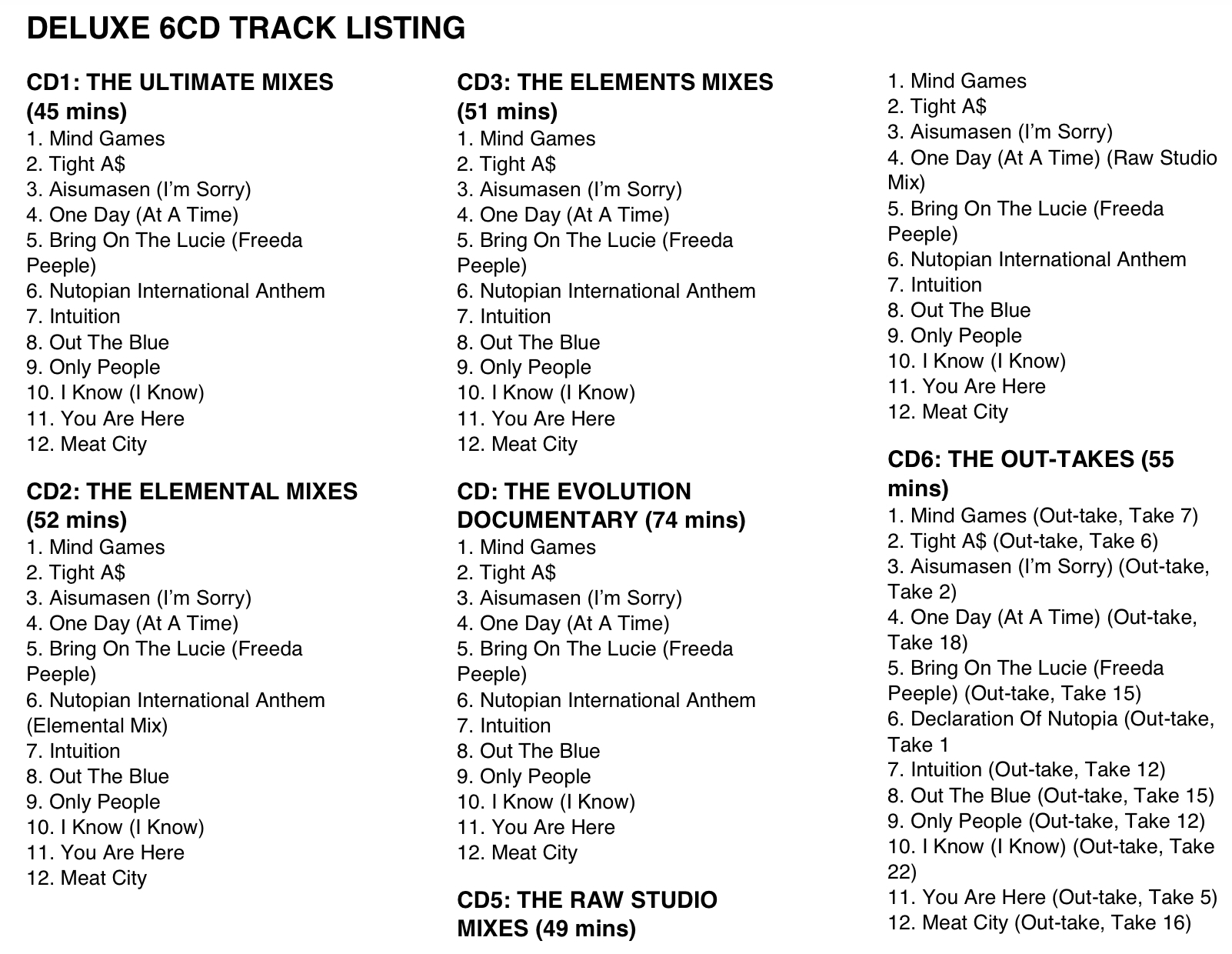
The track listing for the Mind Games box set omits several “Easter eggs”
[The versions range from 2-CD (U.K. here) and 2-LP editions to a Deluxe box set featuring 6-CDs and 2 Blu-ray discs. The various editions are available in the U.S. here and in the U.K. here.]
A very limited Super Deluxe Edition sold-out within days of its announcement. It is, in essence, a time capsule into John and Yoko’s world around the writing and recording of Mind Games, including the times leading up to and after its release in 1973. As innovative as it is elaborate, the Super Deluxe box set is presented in a 13-inch cube, a perspex reproduction of Yoko’s 1966 artwork “Danger Box.”
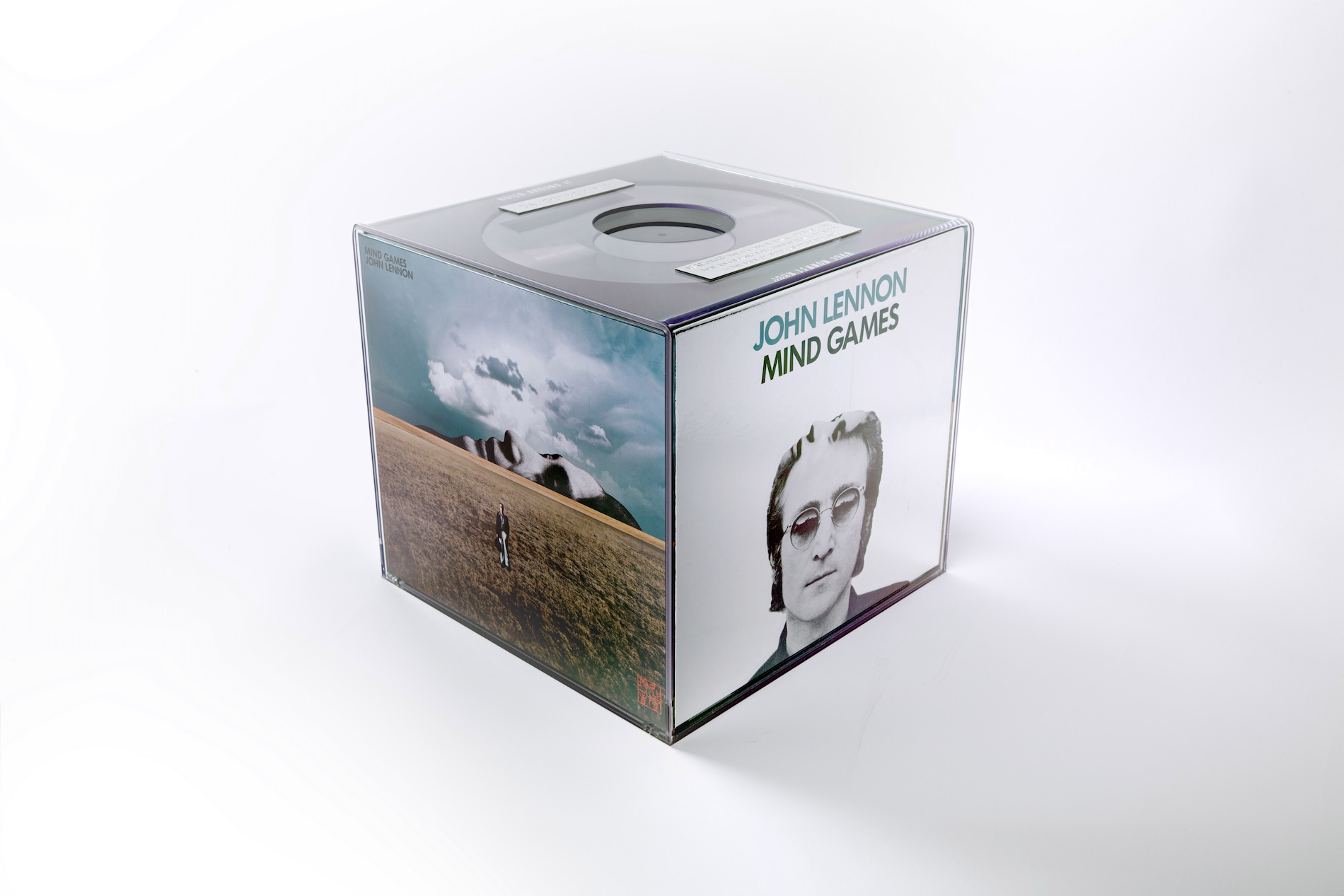
John Lennon Mind Games Super Deluxe Edition
Once lifted, four sides, featuring artwork from Mind Games on shiny Mirror Board, fall to reveal nine individual boxes of various shapes and sizes interlocked together, each with its own look and focus. Hidden throughout the comprehensive and creative set are many Easter Eggs, some of which can only be revealed by using other items in the box to see them, along with loads of other hidden secrets, surprises, puzzles, and “mind games.” The box is housed inside a striking 13” packing container cube adorned with custom art.
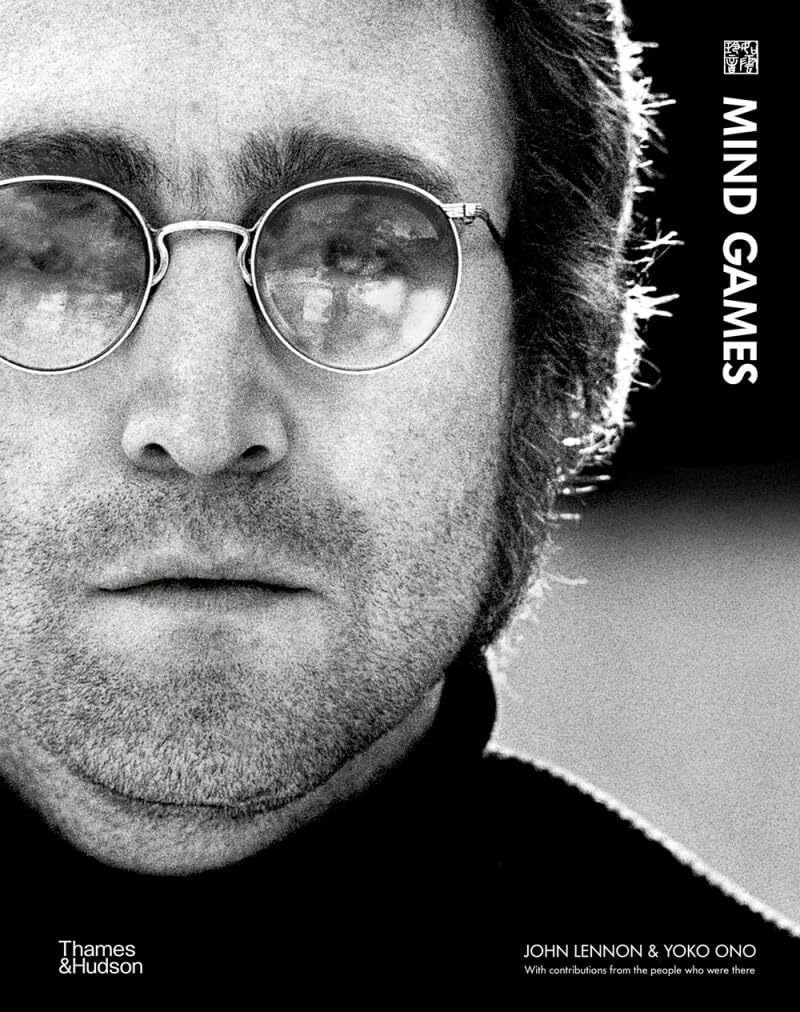
Also available is a book described by its publisher as the “definitive exploration―told in revelatory detail―of the writing, recording, and release of his celebrated and magical fourth solo album, and the era that inspired it.” The book, titled simply Mind Games, and authored by Lennon and Yoko Ono, was announced via Lennon’s social media platforms on Jan. 1. It arrived September 24, via Thames and Hudson. It can be ordered in the U.S. here and in the U.K. here.
More from the book publisher’s announcement: Described by Yoko Ono as “ahead of its time,” Mind Games is a fan favorite that remains a cult classic ever since its first release on October 29, 1973. This insightful and beautiful 288-page book presents handwritten lyrics, letters, artworks by Lennon and Ono, and previously unseen photography alongside their firsthand commentary about the lyrics, songs, and album artwork, as well as contributions from the musicians, friends, engineers, and key figures involved in the making of this landmark album.
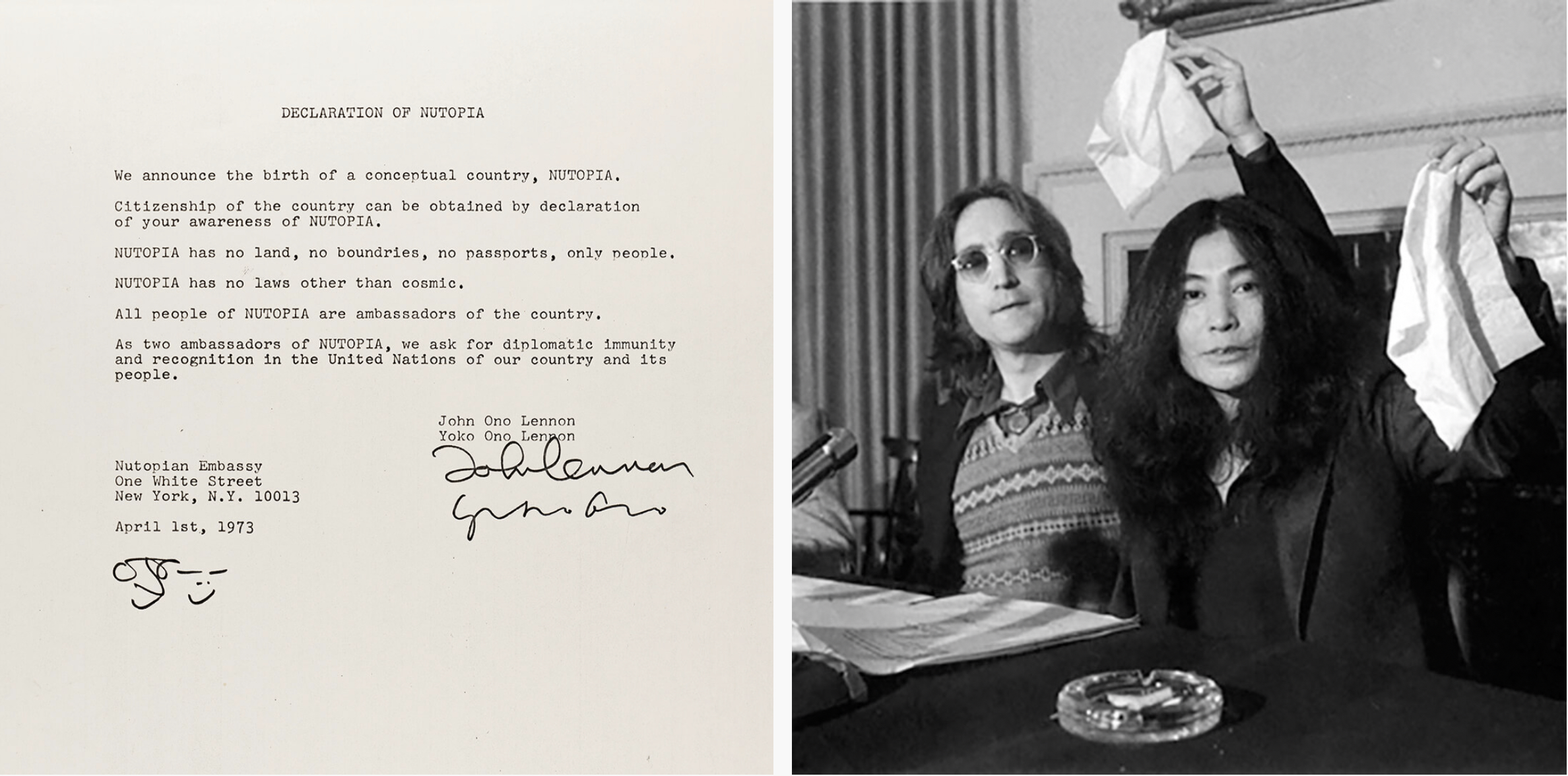
Declaration of Nutopia, April 1, 1973, announced by John & Yoko while waving white handkerchieves as the Nutopian Flag at the press conference having announced the Declaration of Nutopia, Association of the Bar of the City of New York, 42 W 44th Street, NYC, on April 2, 1973 (Photos via JohnLennon.com)
Mind Games was the product of an exceptionally turbulent time for the Lennons. While Nixon and Hoover were attempting to have Lennon deported, John and Yoko endured endless litigations and as the popular press turned on them once again, they bravely rose above it all, continuing their campaigns for non-violent peaceful protest to end the war in Vietnam and for equal rights for women.
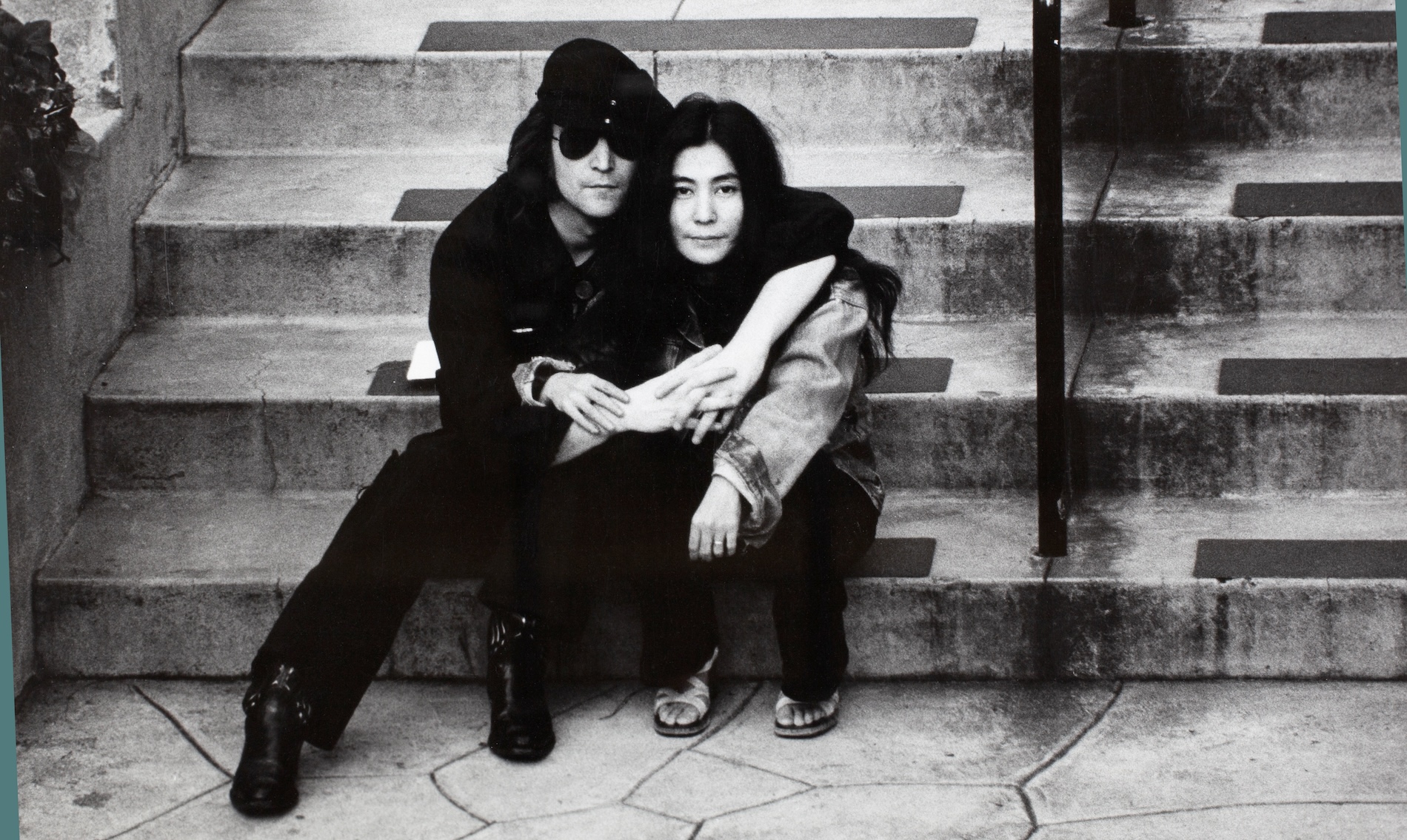
John Lennon and Yoko Ono (Photo © Yoko Ono Lennon; used with mission)
It was also an exciting time when they both re-embraced mysticism and magical thinking. In this book, text and images from the key players are woven together to reveal not only the details behind the creation, recording, and release of this groundbreaking commercial and skillfully crafted recording, but also to shed new light on a period of transformation and experimentation for Lennon and Ono.
Related: A look back at the Mind Games album and title track


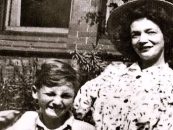
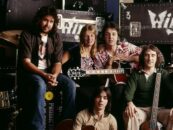
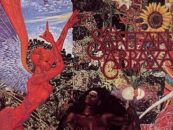
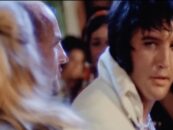

5 Comments so far
Jump into a conversationNothing in the article here about John and Yoko splitting around the time this album was made. In fact I’m surprised to hear Yoko speaking on the “Mind Games” demo video – hadn’t they already separated by then?
Yeah, I’m kind of surprised by that. Possibly the recording of the album was finished before they split, but I’m fairly certain by its release in October, he was May Pang-in’. I’m sorry, was that kind of tacky? Oh well.
As popular as May Pang’s book “Loving John” is/was, I’m surprised it hasn’t been re-printed. A paperback copy from 40 years ago will set you back $100. Or more.
This album was greeted with relief in many quarters in 1973 because it was a total break from the rough ‘n’ roudy, not-terribly-poetic LP of the year before, “Some Time in New York City.,” recorded with David Peel’s NYC band.
In 1977 I was at a Greenwich Village club. My date sat on David Peel’s lap and told him, “If you can’t beer me, somebody will.”
If there were at least three other people in the audience, it was my wife, a friend, and myself. As I remember, he sucked, and there were maybe a dozen people in the audience.